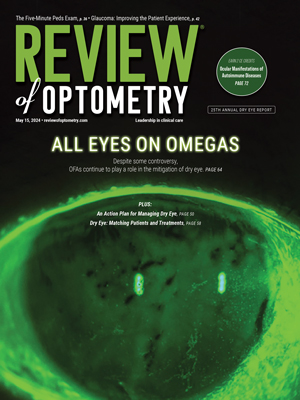Last year more than 250 Americans died from West Nile virus and nearly 4,000 were infected. If one of these patients had wound up in your chair, would you have been able to diagnose the disease by looking in the patients eye? Now you can.
Ophthalmologists at Northwestern University in Chicago have found what they believe to be a characteristic group of ocular symptoms that, when considered along with classic systemic signs and symptoms and positive serology for West Nile, could identify patients with the virus.
The patients left eye at the initial visit. Moderate vitritis overlies the optic disk, and numerous chorioretinal lesions extend superiorly from the optic nerve head.


The doctors examined a 62-year-old woman who had a two-week history of floaters in her left eye, along with symptoms of fatigue, headache and fever for the previous week. The exam further revealed anterior uveitis, vitritis and non-necrotizing chorioretinitis in her left eye, with similar but milder findings in her right eye.
The precipitates resolved with a regimen of prednisolone acetate, but her vision worsened and the fever and fatigue persisted despite a course of oral levofloxacin. Suspicious, the doctors ordered serologic testing for West Nile virus, which came up positive.
West Nile virus can cause flu-like symptoms, but may lead to encephalitis or meningitis in patients older than 50.
Since I first identified this patient, I am aware of several other patients with similar findings and symptoms seen by other retinal surgeons here in Chicago and elsewhere throughout the country, says one of the investigators, Jeffrey R. Parnell, M.D. The study was published in the February issue of Archives of Ophthalmology.
His advice? Maintain a higher index of suspicion if the eye findings are present in a patient with systemic symptoms [who comes] from an endemic area. Obviously a complete history, review of symptoms (both eye and systemic) and complete exam with retinoscopy and biomicroscopy may be helpful in at least prompting one to refer the patient for West Nile work-up.
Dr. Parnell says that patients he knows aboutlike this womanhave had favorable visual outcomes without any targeted treatment.

